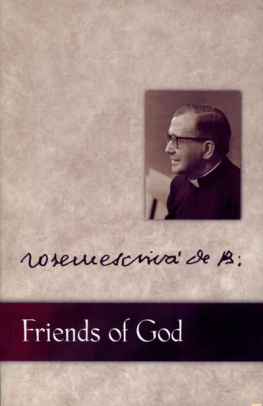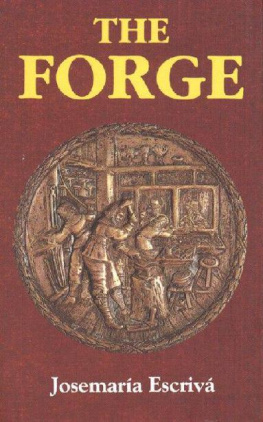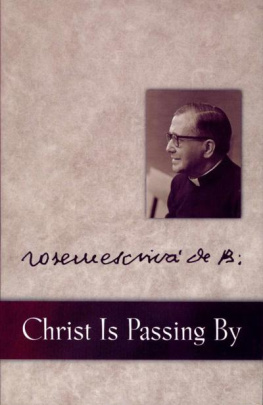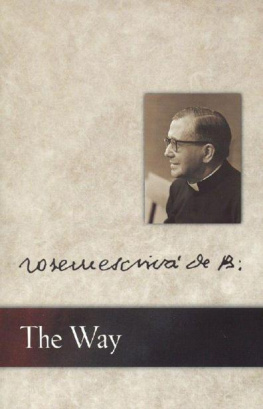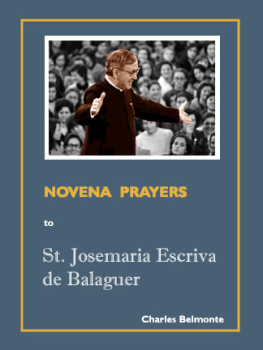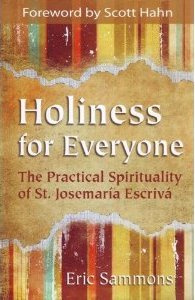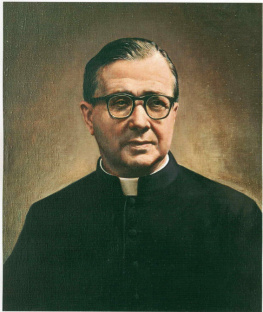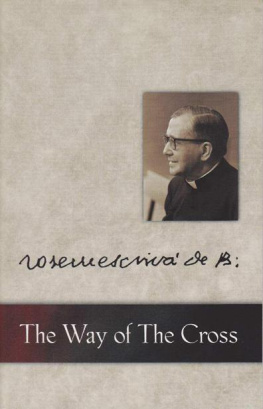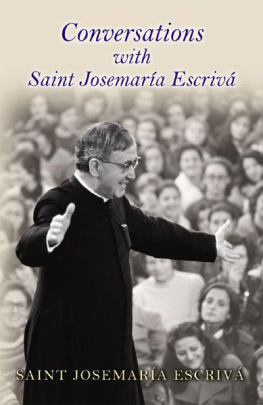St Josemaría Escrivá - Friends of God
Here you can read online St Josemaría Escrivá - Friends of God full text of the book (entire story) in english for free. Download pdf and epub, get meaning, cover and reviews about this ebook. year: 0, genre: Religion. Description of the work, (preface) as well as reviews are available. Best literature library LitArk.com created for fans of good reading and offers a wide selection of genres:
Romance novel
Science fiction
Adventure
Detective
Science
History
Home and family
Prose
Art
Politics
Computer
Non-fiction
Religion
Business
Children
Humor
Choose a favorite category and find really read worthwhile books. Enjoy immersion in the world of imagination, feel the emotions of the characters or learn something new for yourself, make an fascinating discovery.
- Book:Friends of God
- Author:
- Genre:
- Year:0
- Rating:3 / 5
- Favourites:Add to favourites
- Your mark:
- 60
- 1
- 2
- 3
- 4
- 5
Friends of God: summary, description and annotation
We offer to read an annotation, description, summary or preface (depends on what the author of the book "Friends of God" wrote himself). If you haven't found the necessary information about the book — write in the comments, we will try to find it.
Friends of God — read online for free the complete book (whole text) full work
Below is the text of the book, divided by pages. System saving the place of the last page read, allows you to conveniently read the book "Friends of God" online for free, without having to search again every time where you left off. Put a bookmark, and you can go to the page where you finished reading at any time.
Font size:
Interval:
Bookmark:

Friends of God
JOSEMARA ESCRIV
Friends of God

Library of Congress Cataloging-in-Publication Data
Escriv de Balaguer, Jos Mara, 19021975.
[Amigos de Dios. English] Friends of God: homilies / Josmara Escriv. p. cm. Includes bibliographical references and index. ISBN 1889334472 (alk. paper) ISBN 1889334480 (pbk.: alk. paper) 1. Catholic ChurchSermons. 2. Sermons, English. I. Title. BX1756.E77 A413 2002 255.02dc21 2001055143FRIENDS OF GOD
For more information on the life and writings of St. Josemara, please visit the following Websites:
www.josemariaescriva.info
www.escrivaworks.org
Translated from Amigos de Dios (Madrid: Ediciones Rialp, 1977)
Spanish edition copyright 1977, Scriptor, S.A.
English translation copyright 1981, Scepter Ltd, London
This edition copyright 2002 Scepter Publishers Inc.
P.O. Box 211, New York, NY 10018
www.scepterpublishers.org
All rights reserved
eBook ISBN 978-1-59417-103-1
Printed in the United States of America
Contents
God knows best. We men understand so little of his gentle fatherly way of leading us to himself. When I wrote the foreword to Christ Is Passing By in 1973, I just could not have imagined that the holy priest who was its author would be going so soon to his heavenly home. Thousands of us, men and women all over the world, children of his prayer, his sacrifice, and his generous abandonment to the will of God, can apply to him, with immense gratitude, the same words of heartfelt praise that Saint Augustine wrote of our father and lord Saint Joseph: he accomplished the fatherhood of the heart better than anyone else accomplished that of the flesh. He departed this life on Thursday, June 26, 1975, at midday, in this city of the universal charity of the holy Church. As the bells of the Angelus were still echoing in our ears, the Founder of Opus Dei heard the words amice, ascende superius (friend, come unto the joy of Heaven, Lk 14:10), hearing them this time with their full and eternal meaning.
He left this world on an ordinary day, going about his priestly work, fully immersed in conversation with him who is Life itself. This is why he has not died, but is there at Gods side. While he was busy caring for souls, there came to him the sweet and gentle surprise (as he puts it in his homily Toward Holiness, no. 296) of finding himself face to face with Christ, able at last to contemplate the beautiful Face he had longed so much to see: Vultum tuum, Domine, requiram! (Thy face, Lord, do I seek, Ps 26:8).
From the very first moments of his birth into his heavenly home, I began to receive testimonies from countless men and women who had known his saintly life. They expressed, and continue to do so, feelings that now need no holding back. Previously, they had kept silent, out of respect for the humility of a man who considered himself a sinner who is madly in love with Jesus Christ. I had the consolation of hearing directly from the lips of the Holy Father, Pope Paul VI, one of his many warm expressions of praise for the Founder of Opus Dei. Innumerable newspapers and magazines all over the world have published articles of appreciation, written by people nourished in the Christian faith and also by others who do not yet profess to believe in Christ but who have begun to discover him through the words and deeds of Monsignor Josemara Escriv.
As long as I have strength to breathe, I will continue to preach that it is vitally necessary that we be souls of prayer at all times, at every opportunity, and in the most varied of circumstances, because God never abandons us (no. 247). That was his one and only concern: to pray and to encourage others to do likewise. That was why he brought about in the midst of the world a wonderful mobilization of people, as he liked to call it, who are ready to commit themselves to live Christian lives, by developing their filial relationship with God our Father. We are many who have learned, from this thoroughly priestly priest, the great secret of Gods mercy: that we are children of God (no. 145).
In this second volume of homilies we have gathered together some texts that were published while Monsignor Escriv was still with us here on earth, and others from the many which he left for later publication, because he worked unhurriedly and kept working to the end. He never set out to be an author, though he figures among the leading teachers of Christian spirituality. His teaching is both attractive and forceful, and is meant to be lived in the midst of our work, at home, in our dealings with other people, everywhere in fact. He had the art, humanly speaking as well, of giving more generously than one had bargained for. How well he reads! The directness of his expressions, the liveliness of his images, make him accessible to one and all, regardless of differences of mentality and culture. He did his schooling in the Gospel. It is here where he derives his clarity, his ability to strike at the depths of the soul, and his special gift for not going out of fashion, because he never bowed to fashion.
These eighteen homilies present a broad picture of the basic human and Christian virtues for all who wish to follow closely in the footsteps of our Lord. They are neither a theoretical treatise, nor potted hints for acquiring spiritual good manners. They contain living doctrine and combine a theologians depth with the evangelical clarity of a good shepherd of souls. With Monsignor Escriv, words turn into a colloquy with Godprayerbut without ceasing to be a heartfelt conversation completely in tune with the concerns and hopes of his listeners. The homilies are, therefore, a lesson in doctrine and in Christian life in which God is not only spoken of but spoken to. Perhaps it is in this that the secret of his great power of communication lies, because he always refers to the love of God as looking at God without needing rest or feeling tired (no. 296).
Right from the first of these homilies we are reminded of one of the constant themes of Monsignor Escrivs preaching, which is that God calls all men to be saints. Echoing the words of Saint Paul, This is the will of God, your sanctification (1 Thess 4: 3), he points out: We have to become saints, as they say in my part of the world, down to the last whisker, Christians who are truly and genuinely such, the kind that could be canonized. If not, we shall have failed as disciples of the one and only Master (no. 5). Further on he specifies what he means: The holiness that our Lord demands of you is to be achieved by carrying out with love of God your work and your daily duties, and these will almost always consist of small realities (no. 7).
What basis, what grounds do Christians have for nurturing such amazing aspirations in their lives? The answer comes as a sort of refrain, again and again, right through these homilies: it is the humble sense of daring of the person who, knowing himself to be poor and weak, knows also that he is a son of God (no. 11).
Monsignor Escriv sees a clear alternative facing every human being: slavery or divine sonship, this is the dilemma we face. Children of God or slaves to pride (no. 38). Aided by the holy example of the faithful and heroic dedication of the Founder of Opus Dei, I have thought and prayed about this truth with even greater intensity since that day when our Lord took to his side the person I most dearly loved, that without the humility and simplicity of a child we cannot take a single step forward along the path of serving God. Humility means looking at ourselves as we really are, honestly and without excuses. And when we realize that we are worth hardly anything, we can then open ourselves to Gods greatness: it is there where our greatness lies (no. 96).
Next pageFont size:
Interval:
Bookmark:
Similar books «Friends of God»
Look at similar books to Friends of God. We have selected literature similar in name and meaning in the hope of providing readers with more options to find new, interesting, not yet read works.
Discussion, reviews of the book Friends of God and just readers' own opinions. Leave your comments, write what you think about the work, its meaning or the main characters. Specify what exactly you liked and what you didn't like, and why you think so.

